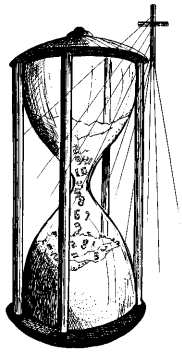
©1986 by Paul D. Ackerman http://www.creationism.org/books/ackerman/
 |
©1986 by Paul D. Ackerman http://www.creationism.org/books/ackerman/ |
|
14 - Yesterday, Today, and Forever Jesus Christ the same yesterday,
|
 |
At the beginning of this book a question
from the Bible was posed for the reader: "Am I a God at hand . . . and
not a God afar off?" (Jer. 23:23). In the sense of scientific evidences
for when he created all things, this book has shown that God is very close
to us indeed. Scientists have been saying for many years that God's creation
was very far away in time, but now the evidence is showing us that this
is not the case.
It is the same in our personal lives. God so often seems far away, but as he bears witness through nature that the time of his creation of all things is quite recent, so he bears witness through the Bible that he is personally near. God created the beautiful world around us a few thousand years ago. He also created us in his image for the purpose of close fellowship in loving obedience. But we disobeyed our loving Creator, and, as he had warned, death, sin, suffering, and separation from his fellowship entered into the perfect world God had created. Through our sin, we brought death and decay not only upon ourselves but on the rest of creation as well. The world and all that is in it became cursed for our sake, and so it remains to this day (Rom. 8:22).
But the story does not end there. The loving God who created us made provision that we might return to close fellowship and eternal life with him. He—God the Son— became one of us, lived a perfect life without sin, and then died on the cross for our sin. To prove that he was God and had gained victory over sin and death, he arose from the grave after three days. The Scripture says that if we proclaim with our lips that Jesus Christ is our Lord and believe in our hearts that God did raise him from the dead, we will be saved and enter into eternal life (Rom. 10:9).
In a discussion with his disciples, Jesus once said that on the basis of their close personal and spiritual knowledge of him, they should believe in his divine nature and mission—but if they could not believe on that basis, they should believe in him on the basis of the miracles and works they had seen him perform (John 14:9-11). In the same manner, he honored the honest skepticism of his disciple Thomas, who said, "Except I shall see in his hands the print of the nails, and put my finger into the print of the nails, and thrust my hand into his side, I will not believe" (John 20:25). The resurrected Jesus later appeared to Thomas and lovingly answered his doubts by saying to him, "Reach hither thy finger, and behold my hands; and reach hither thy hand, and thrust it into my side: and be not faithless, but believing" (v. 27). When Thomas was confronted by the evidence, he spoke to Jesus with the immortal words, "My Lord and my God" (v. 28).
Believe in God. Believe in his Son, Jesus
Christ. And believe in his holy and eternal Word, the Bible. Believe for
the sake of the spiritual knowledge you have of God through faith. Or else
believe on the basis of his many wonderful works, such as the evidences
in this book that point to "his eternal power and Godhead" (Rom. 1:20).
The point is—be not faithless, but believing.
PREV NEXT Start of: "It's A Young World After All" www.creationism.org